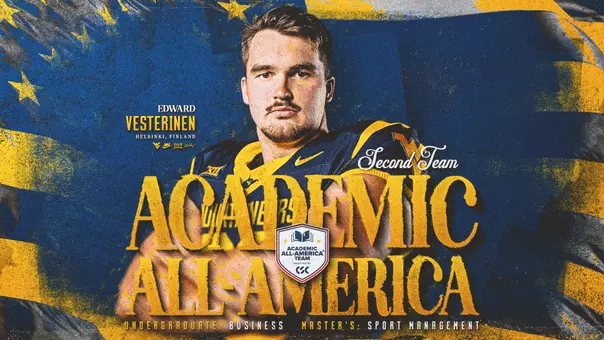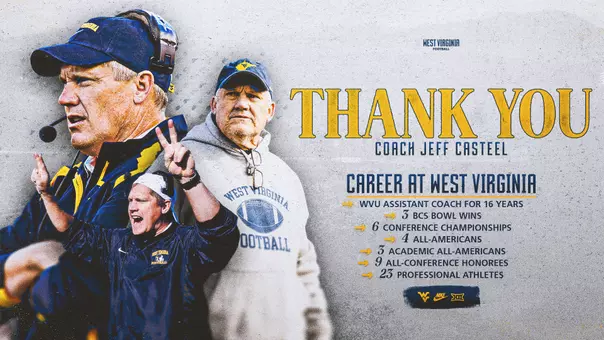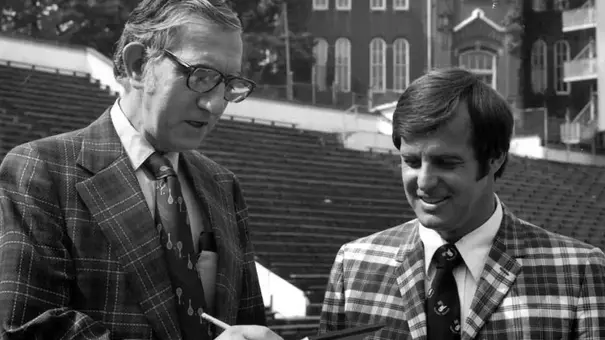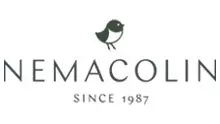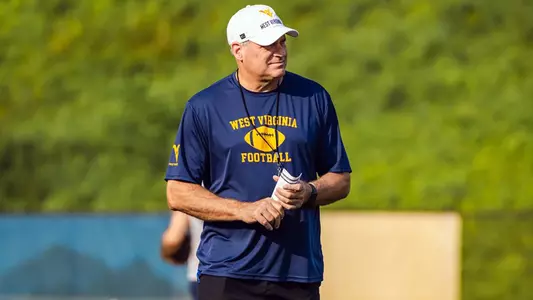
Photo by: WVU Athletic Communications
Answers Starting To Come Into Focus For Rodriguez
August 12, 2025 04:05 PM | Football
MORGANTOWN, W.Va. – This morning's practice up on the Steve Antoline Family Practice Field went seemingly well enough to leave coach Rich Rodriguez in a reasonably relaxed mood during his 20-minute visit with media inside the Milan Puskar Center team room today.
Rodriguez said he was happy to get some warmer weather to help with conditioning, and his guys also got about 25 minutes-worth of live situational teamwork toward the end of practice.
"I thought we got better," he said. "We'll go full pads again Thursday, have a long scrimmage on Saturday, and then try and get some semblance of a depth chart after that."
Eventually, someone asked Rodriguez if he ever considered coaching high school football. From that came a brief recap of his early coaching days, beginning as Corky Griffith's understudy at Salem College.
Griffith, who died in 2022, is likely the only coach in Salem College history to ever attempt to trade in his dealer car during a recruiting trip to Florida. Unhappy with the way it was handling, he just pulled into a car dealership and decided to get a new one.
He couldn't, however, because it wasn't his car to begin with!
Corky also used to mail out recruiting fliers to junior college players in California with a picture of Mountaineer Field on them and tell recruits that they were going to play their Division II games in a 63,000-seat football stadium on Saturdays.
The fun-loving Griffith used to break the ice at social gatherings by introducing himself as a professional liar.
Rich became Corky's defensive backfield coach in 1986-87, while also managing the Tigers' special teams and recruiting. To get his money's worth, Griffith also had his young coach oversee equipment, strength and do a little athletic training on the side.
"I think I got $2,500 for the year, and I lived in the attic of a little cabin with (former Minnesota Vikings standout linebacker) Lonnie Warwick, who was the defensive coordinator," Rodriguez recalled. "We couldn't afford anything. There was carpet, a mattress on the floor and one bathroom in the whole cabin, and I think we got $250 a month for 10 months."
Then came Rodriguez's big break in 1988 when he was named Griffith's successor, a job that lasted just one year before the Tigers dropped the program.
Rich owned the distinction of becoming the youngest unemployed head coach in college football that year.
"When I was head coach at Salem my first year, I was running defense and didn't do anything with the offense," he said. "Then I came (to WVU) as a volunteer coach in '89 for Bill Kirelawich. He was the outside linebackers coach, so I helped him, and I didn't get paid anything.
"I taught driver's ed at North Marion, and they let me do bus duty in the morning to help the kids get off the bus. That way I could leave school early at like 1:30, and I made it just in time for practice," Rodriguez said. "There were three lights I had to hit green, and if one of them turned red, it was going to be tight."
His second head coaching stint at Glenville State in 1990 is when Rodriguez finally began calling his own plays. Rodriguez took over a Pioneer program that had fallen on tough times under the direction of West Virginia high school coaching legend Louie Nocida.
Glenville, the year prior, was shut out six times, and its only victory came against something called the Apprentice School. Jed Drenning, Rodriguez's starting quarterback at Glenville back in those days, believes the apprentices were probably wannabe welders.
"That's when I said, 'Let's just run two-minute drill the whole time, spread them out and get into the shotgun.' That's when this offense got started," Rodriguez remembered.
His very first play call was a 12-yard hook that was completed for a first down, not unlike any simple hook pass that he would call today. Drenning doubts the terminology he used is exactly the same, but the basic concepts from that first play call still apply.
"There were only 500 people in the stands, I was related to 400 of them, and I got a standing ovation," Rodriguez joked. "I'm like, 'Hell, I ain't ever leaving. This place is perfect.'"
Thirty-five years later, Rodriguez is putting together yet another plan for West Virginia's season opener against Robert Morris on Saturday, Aug. 30. He said the basics begin with what his football team can execute.
"What's your core? You can say identity, whatever that is, but what do you know you can execute, and then are they going to let you execute that?" he explained. "Are they just better than you, or have a better idea to stop it?
"So, what are your answers?"
Like all coaches and play callers, Rodriguez has his call sheet always at the ready, but he admits he doesn't look at it much.
"If I've got to look at it, then I don't know my offense. I may look at it for a special situation, but a lot of times, I'm just using it to cover my mouth, so no one sees me cussing or reading my lips," he laughed.
What he does look at frequently is his answer sheet.
"At halftime or during certain breaks, we will look at our answer sheet in all three phases where, 'Okay, if they are running this coverage this is what our answer is going to be.' That answer sheet gets built before the season, and then it's kind of updated on a daily and weekly basis," he explained. "What you have on your answer sheet are kind of your go-to things if they do this, then you do that."
Rodriguez said his answer sheet always gets done about eight days before the first game. These days, he admits there are many more columns for answers than there used to be.
"(Defenses) are more creative than they've ever been," the coach noted. "You used to have maybe six or seven categories, and now it's like 15 because there are so many different, creative defenses. In the run game, the 'backers used to fit here, the safeties fit here, and the D-line fits here, and the backside just shoots to the ball as fast as they can to stop the cutback.
"Now, they fit the frontside of the run one way and they're fitting the backside another way, so it's way more multiple each and every week than it ever used to be," he said. "When I watch the old clips it's like, 'Golly, that's just a base defense' so you have to adapt. Offenses are doing a lot more variety, too."
Back in the Salem days, when Rodriguez first began working for Griffith, there is no telling what ol' Corky would have had them put on their answer sheets.
Rest assured, if it required diving into the dumpster like Bluto Blutarski once did to get the answers, Corky would have been all for it.
As long as it was the right test!
West Virginia continues practice work on Wednesday morning.
Rodriguez said he was happy to get some warmer weather to help with conditioning, and his guys also got about 25 minutes-worth of live situational teamwork toward the end of practice.
"I thought we got better," he said. "We'll go full pads again Thursday, have a long scrimmage on Saturday, and then try and get some semblance of a depth chart after that."
Eventually, someone asked Rodriguez if he ever considered coaching high school football. From that came a brief recap of his early coaching days, beginning as Corky Griffith's understudy at Salem College.
Griffith, who died in 2022, is likely the only coach in Salem College history to ever attempt to trade in his dealer car during a recruiting trip to Florida. Unhappy with the way it was handling, he just pulled into a car dealership and decided to get a new one.
He couldn't, however, because it wasn't his car to begin with!
Corky also used to mail out recruiting fliers to junior college players in California with a picture of Mountaineer Field on them and tell recruits that they were going to play their Division II games in a 63,000-seat football stadium on Saturdays.
The fun-loving Griffith used to break the ice at social gatherings by introducing himself as a professional liar.
Rich became Corky's defensive backfield coach in 1986-87, while also managing the Tigers' special teams and recruiting. To get his money's worth, Griffith also had his young coach oversee equipment, strength and do a little athletic training on the side.
"I think I got $2,500 for the year, and I lived in the attic of a little cabin with (former Minnesota Vikings standout linebacker) Lonnie Warwick, who was the defensive coordinator," Rodriguez recalled. "We couldn't afford anything. There was carpet, a mattress on the floor and one bathroom in the whole cabin, and I think we got $250 a month for 10 months."
Then came Rodriguez's big break in 1988 when he was named Griffith's successor, a job that lasted just one year before the Tigers dropped the program.
Rich owned the distinction of becoming the youngest unemployed head coach in college football that year.
"When I was head coach at Salem my first year, I was running defense and didn't do anything with the offense," he said. "Then I came (to WVU) as a volunteer coach in '89 for Bill Kirelawich. He was the outside linebackers coach, so I helped him, and I didn't get paid anything.
"I taught driver's ed at North Marion, and they let me do bus duty in the morning to help the kids get off the bus. That way I could leave school early at like 1:30, and I made it just in time for practice," Rodriguez said. "There were three lights I had to hit green, and if one of them turned red, it was going to be tight."
His second head coaching stint at Glenville State in 1990 is when Rodriguez finally began calling his own plays. Rodriguez took over a Pioneer program that had fallen on tough times under the direction of West Virginia high school coaching legend Louie Nocida.
Glenville, the year prior, was shut out six times, and its only victory came against something called the Apprentice School. Jed Drenning, Rodriguez's starting quarterback at Glenville back in those days, believes the apprentices were probably wannabe welders.
"That's when I said, 'Let's just run two-minute drill the whole time, spread them out and get into the shotgun.' That's when this offense got started," Rodriguez remembered.
His very first play call was a 12-yard hook that was completed for a first down, not unlike any simple hook pass that he would call today. Drenning doubts the terminology he used is exactly the same, but the basic concepts from that first play call still apply.
"There were only 500 people in the stands, I was related to 400 of them, and I got a standing ovation," Rodriguez joked. "I'm like, 'Hell, I ain't ever leaving. This place is perfect.'"
Thirty-five years later, Rodriguez is putting together yet another plan for West Virginia's season opener against Robert Morris on Saturday, Aug. 30. He said the basics begin with what his football team can execute.
"What's your core? You can say identity, whatever that is, but what do you know you can execute, and then are they going to let you execute that?" he explained. "Are they just better than you, or have a better idea to stop it?
"So, what are your answers?"
Like all coaches and play callers, Rodriguez has his call sheet always at the ready, but he admits he doesn't look at it much.
"If I've got to look at it, then I don't know my offense. I may look at it for a special situation, but a lot of times, I'm just using it to cover my mouth, so no one sees me cussing or reading my lips," he laughed.
What he does look at frequently is his answer sheet.
"At halftime or during certain breaks, we will look at our answer sheet in all three phases where, 'Okay, if they are running this coverage this is what our answer is going to be.' That answer sheet gets built before the season, and then it's kind of updated on a daily and weekly basis," he explained. "What you have on your answer sheet are kind of your go-to things if they do this, then you do that."
Rodriguez said his answer sheet always gets done about eight days before the first game. These days, he admits there are many more columns for answers than there used to be.
"(Defenses) are more creative than they've ever been," the coach noted. "You used to have maybe six or seven categories, and now it's like 15 because there are so many different, creative defenses. In the run game, the 'backers used to fit here, the safeties fit here, and the D-line fits here, and the backside just shoots to the ball as fast as they can to stop the cutback.
"Now, they fit the frontside of the run one way and they're fitting the backside another way, so it's way more multiple each and every week than it ever used to be," he said. "When I watch the old clips it's like, 'Golly, that's just a base defense' so you have to adapt. Offenses are doing a lot more variety, too."
Back in the Salem days, when Rodriguez first began working for Griffith, there is no telling what ol' Corky would have had them put on their answer sheets.
Rest assured, if it required diving into the dumpster like Bluto Blutarski once did to get the answers, Corky would have been all for it.
As long as it was the right test!
West Virginia continues practice work on Wednesday morning.
Rich Rodriguez | Dec. 3
Wednesday, December 03
Reid Carrico | Nov. 29
Saturday, November 29
Jeff Weimer | Nov. 29
Saturday, November 29
Rich Rodriguez | Nov. 29
Saturday, November 29
